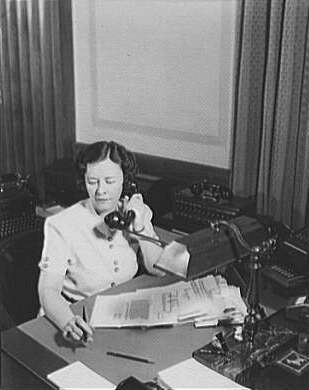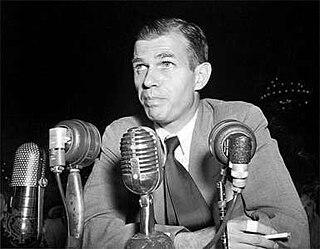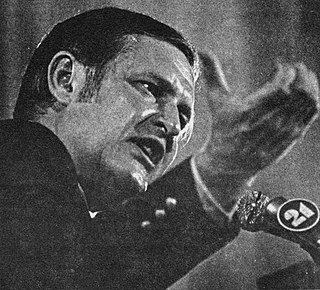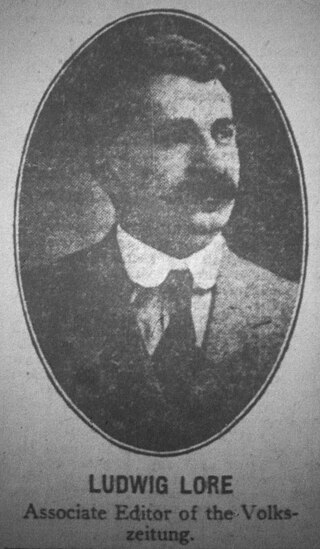Related Research Articles

Helen Wilburforce Gandy was the American longtime secretary to Federal Bureau of Investigation director J. Edgar Hoover, who called her "indispensable". Serving in that role for 54 years she exercised great behind-the-scenes influence on Hoover and the operations of the Bureau. Following Hoover's death in 1972, she spent weeks destroying his "Personal File," thought to contain the most incriminating material Hoover used to manipulate or blackmail the most powerful figures in Washington.

John Edgar Hoover was an American law enforcement administrator who served as the final Director of the Bureau of Investigation (BOI) and the first Director of the Federal Bureau of Investigation (FBI). President Calvin Coolidge first appointed Hoover as director of the BOI, the predecessor to the FBI, in 1924. After 11 years in the post, Hoover became instrumental in founding the FBI in June 1935, where he remained as director for an additional 37 years until his death in May 1972 – serving a total of 48 years leading both the BOI and the FBI under eight Presidents.

The Watergate scandal was a major political controversy in the United States during the presidency of Richard Nixon from 1972 to 1974, ultimately resulting in Nixon's resignation. The name originated from attempts by the Nixon administration to conceal its involvement in the June 17, 1972 break-in at the Democratic National Committee headquarters located in the Watergate Office Building in Washington, D.C.

Alger Hiss was an American government official accused in 1948 of having spied for the Soviet Union in the 1930s. The statute of limitations had expired for espionage, but he was convicted of perjury in connection with this charge in 1950. Before the trial, Hiss was involved in the establishment of the United Nations, both as a US State Department official and as a UN official. In later life, he worked as a lecturer and author.

James Riddle Hoffa was an American labor union leader who served as the president of the International Brotherhood of Teamsters (IBT) from 1957 until 1971. He is notorious for his alleged ties to organized crime and for his disappearance under mysterious circumstances in 1975.

Louis Patrick Gray III was acting director of the Federal Bureau of Investigation (FBI) from May 3, 1972, to April 27, 1973. During this time, the FBI was in charge of the initial investigation into the burglaries that sparked the Watergate scandal, which eventually led to the resignation of President Nixon. Gray was nominated as permanent Director by Nixon on February 15, 1973, but failed to win Senate confirmation. He resigned as Acting FBI director on April 27, 1973, after he admitted to destroying documents that had come from convicted Watergate conspirator E. Howard Hunt's safe—documents received on June 28, 1972, 11 days after the Watergate burglary, and given to Gray by White House counsel John Dean.

Deep Throat is the pseudonym given to the secret informant who provided information in 1972 to Bob Woodward, who shared it with Carl Bernstein. Woodward and Bernstein were reporters for The Washington Post, and Deep Throat provided key details about the involvement of U.S. president Richard Nixon's administration in what came to be known as the Watergate scandal. In 2005, 31 years after Nixon's resignation and 11 years after Nixon's death, a family attorney stated that former Federal Bureau of Investigation (FBI) Associate Director Mark Felt was Deep Throat. By then, Felt was suffering from dementia and had previously denied being Deep Throat, but Woodward and Bernstein then confirmed the attorney's claim.

Daniel Louis Schorr was an American journalist who covered world news for more than 60 years. He was most recently a Senior News Analyst for National Public Radio (NPR). Schorr won three Emmy Awards for his television journalism.

Jack Northman Anderson was an American newspaper columnist, syndicated by United Features Syndicate, considered one of the founders of modern investigative journalism. Anderson won the 1972 Pulitzer Prize for National Reporting for his investigation on secret U.S. policy decision-making between the United States and Pakistan during the Indo-Pakistani War of 1971. In addition to his newspaper career, Anderson also had a national radio show on the Mutual Broadcasting System, acted as Washington bureau chief of Parade magazine, and was a commentator on ABC-TV's Good Morning America for nine years.

William Mark Felt Sr. was an American law enforcement officer who worked for the Federal Bureau of Investigation (FBI) from 1942 to 1973 and was known for his role in the Watergate scandal. Felt was an FBI special agent who eventually rose to the position of Deputy Director, the Bureau's second-highest-ranking post. Felt worked in several FBI field offices prior to his promotion to the Bureau's headquarters. In 1980, he was convicted of having violated the civil rights of people thought to be associated with members of the Weather Underground, by ordering FBI agents to break into their homes and search the premises as part of an attempt to prevent bombings. He was ordered to pay a fine, but was pardoned by President Ronald Reagan during his appeal.
Ralph de Toledano was an American writer in the conservative movement in the United States throughout the second half of the 20th century. A friend of Richard Nixon, he was a journalist and editor of Newsweek and the National Review, and the author of 26 books, including two novels and a book of poetry. Besides his political contributions, he also wrote about music, particularly jazz.

Anna Chennault, born Chan Sheng Mai, 陳香梅, also known as Anna Chan Chennault or Anna Chen Chennault, was a war correspondent and prominent Republican member of the U.S. China Lobby. She was married to American World War II aviator General Claire Chennault.

Jon Wiener is an American historian and journalist based in Los Angeles, California. His most recent book is Set the Night on Fire: L.A. in the Sixties, a Los Angeles Times bestseller co-authored by Mike Davis. He waged a 25-year legal battle to win the release of the FBI's files on John Lennon. Wiener played a key role in efforts to expose the surveillance, as well as the behind-the-scenes battling between the government and the former Beatle, and is an expert on the FBI-versus-Lennon controversy. A professor emeritus of United States history at the University of California, Irvine and host of The Nation's weekly podcast, Start Making Sense, he is also a contributing editor to the progressive political weekly magazine The Nation. He also hosts a weekly radio program in Los Angeles.
Plain Talk was an American monthly anticommunist magazine that was published for 44 months from 1946 to 1950. Its editor-in-chief was Isaac Don Levine.

Tim Weiner is an American reporter and author. He is the author of five books and co-author of a sixth, and winner of the Pulitzer Prize and National Book Award.
Leo Katcher was an American reporter, screenwriter, and author. As West Coast Correspondent of the New York Post in 1952, he helped to break the story about Nixon's election expenses, which provoked Nixon into making his televised defence, still remembered as the Checkers Speech. In 1956, Katcher was nominated for an Academy Award for Best Story for The Eddy Duchin Story.
Arkadi Maslow, born Isaak Yefimowich Chemerinsky was a communist politician in the German Republic, Along with his partner Ruth Fischer, he was a leading figure in the Communist Party of Germany (KPD) through both the May 1924 and December 1924 federal elections.

Ludwig Lore was an American socialist magazine editor, newspaper writer, lecturer, and politician, best remembered for his tenure as editor of the socialist New Yorker Volkszeitung and role as a factional leader in the early American communist movement. During the middle 1930s, he wrote the daily foreign affairs column "Behind the Cables" for the New York Post. Later still, he was charged with having secretly worked recruiting potential agents and gathering information on behalf of the Soviet foreign intelligence network.
Arnold Aaron Hutschnecker was an Austrian-American medical doctor with a specialisation in psychiatry.
Elaine Shannon is an American investigative journalist and former correspondent for Newsweek and Time considered an expert on terrorism, organized crime, and espionage. Describing her also as "a leading expert on the evil alliances of drug kingpins and corrupt officials", Newsweek said Shannon "could rightly claim to be the Boswell of thugs and drugs."
References
- 1 2 3 4 5 6 7 8 "Guenther Reinhardt, 63, Dies; Was a Writer and Investigator". New York Times. 3 December 1968. Retrieved 27 December 2019.
- 1 2 "Who Was Who in America, Volume 5". Marquis-Who's Who. 1973. p. 559. ISBN 978-0-8379-0205-0 . Retrieved 27 December 2019.
- 1 2 3 4 5 6 7 8 9 10 11 12 13 Robb, David L. (2012). The Gumshoe and the Shrink: Guenther Reinhardt, Dr. Arnold Hutschnecker, and the Secret History of the 1960 Kennedy-Nixon Election . Santa Monica Press. pp. 8 (Sam Spade, September 1960), 9-10 (Toledano), 20-1 (bio), 22 (crime without punishment), 22-24 (FBI) 23 (marriage), 23-4 (National Press Club, 24 (Gardner Jackson), 28 (Association of Foreign Journalists), 260-1 (National Press Club). ISBN 978-1-59580-066-4 . Retrieved 27 December 2019.
- ↑ "Guenther Reinhardt". DocumentsTalk. 2008. Retrieved 29 December 2019.
- 1 2 3 4 Reinhardt, Guenther (1952). Crime Without Punishment: The Secret Soviet Terror Against America. Hermitage House. pp. 19-37 (Poyntz), 21 (Ludwig Lore), 24 (Lore), 25 (European Whirligig, Whittaker Chambers), 27-29 (Lore), 31-3 (Lore), 41-3 (Lore), 109 (Lore). Retrieved 27 December 2019.
- 1 2 3 Reinhardt, Guenther (1939). Benjamin Pettengill Adams; B.P. Adams (eds.). You Americans; fifteen foreign press correspondents report their impressions of the United States and its people. Funk & Wagnalls. pp. 144 (bio). Retrieved 27 December 2019.
- 1 2 Lichtbau, John H. (1939). "Murder and Mystery". New York Times. pp. 144 (bio). Retrieved 27 December 2019.
- ↑ Pettengill Adams, Benjamin, ed. (1939). You Americans: Fifteen Foreign Press Correspondents Report Their Impressions of the United States and Its People. Funk & Wagnalls Company. p. 144.
- ↑ "Frederic Sondern Jr., an Editor For Reader's Digest, Dies at 55". New York Times. 5 August 1966. p. 24. Retrieved 29 December 2019.
- ↑ Chambers, Whittaker (May 1952). Witness. New York: Random House. p. 392. ISBN 9780895269157 . Retrieved 29 December 2019.
- ↑ Sayers, Ian; Botting, Douglas (1984). Nazi Gold: The Story of the Worlds̓ Greatest Robbery - and Its Aftermath. Granada Publishing. pp. 290–2, 323. ISBN 9780246117670 . Retrieved 29 December 2019.
- ↑ "Robbing the Reich". New York Times. 5 May 1984. pp. 7–18. Retrieved 29 December 2019.
- ↑ Robb, David L. (2012). The Gumshoe and the Shrink: Guenther Reinhardt, Dr. Arnold Hutschnecker, and the Secret History of the 1960 Kennedy-Nixon Election . Santa Monica Press. ISBN 978-1-59580-066-4. LCCN 2011049062.
- ↑ Robb, David L. (2012). The Gumshoe and the Shrink: Guenther Reinhardt, Dr. Arnold Hutschnecker, and the Secret History of the 1960 Kennedy-Nixon Election. Santa Monica Press. ISBN 9781595800664 . Retrieved 27 December 2019.
- ↑ "The Gumshoe and the Shrink: Guenther Reinhardt, Dr. Arnold Hutschnecker, and the Secret History of the 1960 Kennedy-Nixon Election". Publishers Weekly. 2012. Retrieved 27 December 2019.
- ↑ "A Judge Confesses He Does Not Know What Blackjack Is". New York Times. 29 February 1964. p. 23. Retrieved 29 December 2019.
- ↑ "Investigator Taken to Court 37th Time". New York Times. 1 April 1964. Retrieved 29 December 2019.
- ↑ Reinhardt, Guenther (7 December 1959). "Mr. Reinhardt Objects". New York Times. p. 181. Retrieved 29 December 2019.
- ↑ Reinhardt, Guenther (1939). Benjamin Pettengill Adams; B.P. Adams (eds.). You Americans; fifteen foreign press correspondents report their impressions of the United States and its people. Funk & Wagnalls. LCCN 39027957.
- ↑ Lessing, Gotthold Ephraim (1950). Nathan the Wise (Nathan der Weise). Translated by Guenther Reinhardt. Barron's Educational Series. LCCN 52024133.
- ↑ Reinhardt, Guenther (1952). Crime Without Punishment: The Secret Soviet Terror Against America. Hermitage House. LCCN 52012850.
- ↑ The Jews in Nazi Germany. American Jewish Committee. 1935. Retrieved 29 December 2019.
- ↑ Reinhardt, Guenther (24 May 1944). "Invasion Prayers Are Ready". New York Times: 18. Retrieved 29 December 2019.